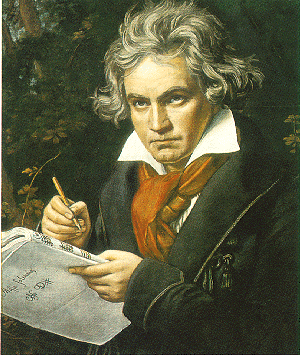Happy birthday, Beethoven!

By Aussiegirl
(Today is the immortal Beethoven's birthday, so I have decided to republish my 2005 birthday post that included the poet Franz Grillparzer's beautiful funeral oration. I have also included Pindar's comment that gives some additional information on the funeral.)
December 16, 1770 - March 26, 1827
In commemoration of the birthday of the great titanic genius who was Beethoven, no better words could be uttered than those delivered at his graveside. Beethoven sleeps, while we live on the dream of the unutterably beautiful and profound music that he left behind.
The Graveside Funeral Oration for Ludwig van Beethoven
Written by the poet Franz Grillparzer
Standing by the grave of him who has passed away we are in a manner the representatives of an entire nation, of the whole German people, mourning the loss of the one highly acclaimed half of that which was left us of the departed splendor of our native art, of the fatherland's full spiritual bloom. There yet lives—and may his life be long!—the hero of verse in German speech and tongue; but the last master of tuneful song, the organ of soulful concord, the heir and amplifier of Handel and Bach's, of Haydn and Mozart's immortal fame is now no more, and we stand weeping over the riven strings of the harp that is hushed.
The harp that is hushed! Let me call him so! For he was an artist, and all that was his, was his through art alone. The thorns of life had wounded him deeply, and as the cast-away clings to the shore, so did he seek refuge in thine arms, O thou glorious sister and peer of the Good and the True, thou balm of wounded hearts, heaven-born Art! To thee he clung fast, and even when the portal was closed wherethrough thou hadst entered in and spoken to him, when his deaf ear had blinded his vision for thy features, still did he ever carry thine image within his heart, and when he died it still reposed on his breast.
He was an artist—and who shall arise to stand beside him?
As the rushing behemoth spurns the waves, so did he rove to the uttermost bounds of his art. From the cooing of doves to the rolling of thunder, from the craftiest interweaving of well-weighed expedients of art up to that awful pitch where planful design disappears in the lawless whirl of contending natural forces, he had traversed and grasped it all. He who comes after him will not continue him; he must begin anew, for he who went before left off only where art leaves off. Adelaide and Leonora! Triumph of the heroes of Vittoria—and the humble sacrificial song of the Mass!—Ye children of the voices divided thrice and four times! heaven-soaring harmony: "Freude, schöner Götterfunken," thou swan song! Muse of song and the seven-stringed lyre! Approach his grave and bestrew it with laurel!
He was an artist, but a man as well. A man in every sense—in the highest. Because he withdrew from the world, they called him a man-hater, and because he held aloof from sentimentality, unfeeling. Ah, one who knows himself hard of heart, does not shrink! The finest points are those most easily blunted and bent or broken. An excess of sensitiveness avoids a show of feeling! He fled the world because, in the whole range of his loving nature, he found no weapon to oppose it. He withdrew from mankind after he had given them his all and received nothing in return. He dwelt alone, because he found no second Self. But to the end his heart beat warm for all men, in fatherly affection for his kindred, for the world his all and his heart's blood.
Thus he was, thus he died, thus he will live to the end of time.
You, however, who have followed after us hitherward, let not your hearts be troubled! You have not lost him, you have won him. No living man enters the halls of the immortals. Not until the body has perished, do their portals unclose. He whom you mourn stands from now onward among the great of all ages, inviolate forever. Return homeward, therefore, in sorrow, yet resigned! And should you ever in times to come feel the overpowering might of his creations like an onrushing storm, when your mounting ecstasy overflows in the midst of a generation yet unborn, then remember this hour, and think, We were there, when they buried him, and when he died, we wept.
At 5:58 PM, Pindar said...
Thanks, Aussiegirl, for posting this beautiful and inspiring funeral oration for my favorite composer. And your words echoed deep within my soul: "Beethoven sleeps, while we live on the dream of the unutterably beautiful and profound music that he left behind". Here are a few extra facts that I found: On the afternoon of Thursday, March 29th, 1827, between 10,000 and 30,000 people gathered for the funeral of Ludwig van Beethoven.
The actor Heinrich Anschütz read the funeral oration written by Franz Grillparzer, Austria's greatest dramatic poet, in front of the doors of the Währing Cemetary (now Schubert Park). Also, it turns out that Grillparzer (1791-1872) first met Beethoven in 1803, and in 1823 the two men made plans to collaborate on an opera--but nothing came of it.


5 Comments:
I love Moonlight Sonata:)
Thanks for posting this again. Beethoven is my second favorite composer, right behind Johann Sebastian Bach!
thanks for the information about this great mussician, not only a inmmortal in the music world, also a inmmortal in the human world history.
Hi, nice post. I have been wondering about this topic,so thanks for sharing. I will certainly be subscribing to your blog.
It’s incredible what that man did, he was a true genius, his music is a peace of art in every note, no one can compare to him, happy birthday!!
Post a Comment
<< Home